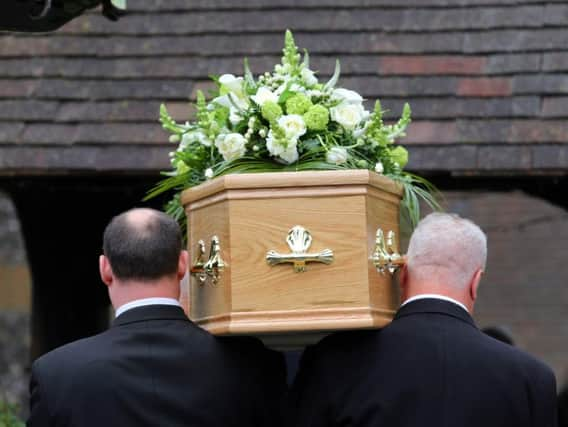More people choosing to die at home in Nottinghamshire


The latest data from Public Health England reveals that about 24 per cent of the deaths registered in 2017 occurred at home, up from 22 per cent five years earlier.
The data identifies the four most common places of death as hospitals, care homes, hospices and homes.
Advertisement
Hide AdAdvertisement
Hide AdThe number of people dying at home has risen over the last five years - from 7,593 in 2012 to 2,033 in 2017.
But the biggest chunk of deaths in Nottinghamshire occur in hospitals – 47 in total in 2017.
About 24 per cent of the deaths in the area occurred at care home facilities while 4% took place at hospices.
A recent study carried out by King's College London found out that most people prefer to die in the place they are usually cared for, including home, rather than in a hospital.
Advertisement
Hide AdAdvertisement
Hide AdAnna Bone, lead author of the study, warned that hospital deaths could rise unless capacity continues to increase in care homes.
She said: “The projected rise of deaths in care homes is striking and warns of the urgent need to ensure adequate bed capacity, resources and training of staff in palliative care in all care homes in the country.
“If we are to continue enabling people to die in their preferred place, it is essential to invest more in care homes and community health services.
"Without this investment, people are likely to seek help from hospitals, which puts pressure on an already strained system and is not where people would rather be at the end of their lives”.
Advertisement
Hide AdAdvertisement
Hide AdOn average, 46 per cent of deaths registered in England in 2017 took place in hospitals. Home was the second most common place to die, with 24 per cent of the total.
Care homes were the location of 22 per cent of deaths, followed by hospices, with just six per cent.
Matthew Reed, chief executive at the terminal illness charity Marie Curie, said: "For those patients at the end of their lives, hospices provide vital, person-centred care and support families before and after their loved one has died.
"In the absence of more hospice capacity being funded we would expect the number of deaths in hospices to remain constant.
Advertisement
Hide AdAdvertisement
Hide Ad"But we know that the total number of people dying will increase significantly over the next decade and much needs to be done to ensure that this doesn’t mean many more people dying unnecessarily in overcrowded hospitals."